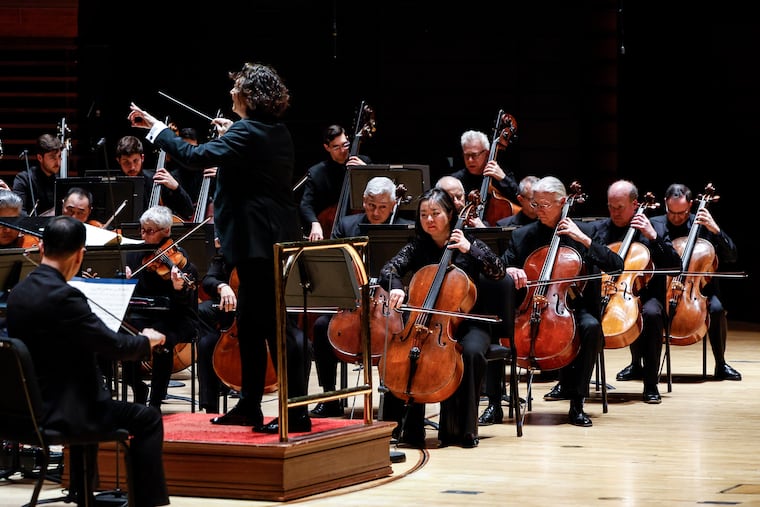The Philadelphia Orchestra’s Nathalie Stutzmann led her last program as principal guest conductor. It was a mixed success.
The Philadelphia Symphonic Choir had presence and a distinct personality in the Mozart Requiem.

Big expectations Friday night surrounded Nathalie Stutzmann’s final word as the Philadelphia Orchestra’s principal guest conductor. Stutzmann started out her musical life as an acclaimed contralto, and the program’s main draw was a piece calling for decidedly vocal sensibilities — the Requiem begun by Mozart in the beloved completion credited to Franz Xaver Süssmayr.
The concert — repeated twice this weekend — was a funny mix of quite beautiful moments and missed opportunities. The program’s other half was taken up by a Schumann Symphony No. 4 of lean textures and, near the end, tempos so fast they seemed almost silly.
Stutzmann’s three seasons as the Philadelphia Orchestra’s principal guest conductor have been good for the conductor; midway through her time here she became music director of the Atlanta Symphony Orchestra. What has her tenure meant to Philadelphia? The job description of principal guest conductor is always a kind of tabula rasa. Her predecessor, Stéphane Denève, favored John Williams and Rachmaninoff. Her successor, Marin Alsop, has wide interests and seems poised to bring her bent for podium mentorship here.
But it seemed inevitable that, as a singer, Stutzmann’s great insights would come in her work with vocalists, and so it was for Friday night’s Requiem with the Philadelphia Symphonic Choir and four vocal soloists.
Putting the soloists with the choir behind the orchestra rather than at the front of the stage was understandable. The chorus, soloists and three trombonists are in dialogue so much of the time you want them as close as possible so they can hear each other.
But Stutzmann more than most knows the power of nuance in the human voice, and that quality was often difficult to discern. It was lovely that the character of this quartet’s respective voices covered a spectrum — Erin Morley’s pinpoint soprano glow, Sara Mingardo’s velvet contralto, Kenneth Tarver’s clarion tenor, and Harold Wilson’s crisp, resonant bass. In solo moments, though, particularly those from Morley, the subtleties were sometimes lost to the distance from the audience.
The organ added a layer of complexity to the ensemble sound, when you could hear it. Often, you could see Peter Richard Conte plugging away at the small portative organ (the instrument was not a console of the hall’s mighty main instrument), with no audible result.
The relatively young Philadelphia Symphonic Choir under director Joe Miller has developed a distinct personality. If the sopranos sometimes grew harsh (and that really was a problem Stutzmann should have solved), for the overwhelming majority of the performance the ensemble had everything you could want — clarity, power, specificity of dynamics and, best of all, a good collective ear for how it fits in with the whole.
Stutzmann has absorbed some of the qualities of the historically informed music movement, with quicker tempos and minimized string vibrato. Often it worked. I wished she would have let the music breathe more in places — such as in the “Recordare,” which, with its talk of hope and redemption, has some of the most relaxed music in the piece. And she took the “Kyrie” and “Dies irae” faster than the character of the music suggested.
But the orchestra met her demands at every turn. Trombonists Matthew Vaughn, Nitzan Haroz and Blair Bollinger were virtuosos in a way you might not think possible for their instruments, not only fleet but also able to meld the sonorities of brass to human voices. When it all clicked, it really clicked, as it did in a “Benedictus” where vocal soloists and orchestra engaged in an operatic interplay so warm and ennobling it could have doubled in The Magic Flute as a denouement most profound.
Repeated Saturday at 8 p.m. and Sunday at 2 p.m. in Verizon Hall, Broad and Spruce Streets. Tickets are $88-$199. philorch.org, 215-893-1999.